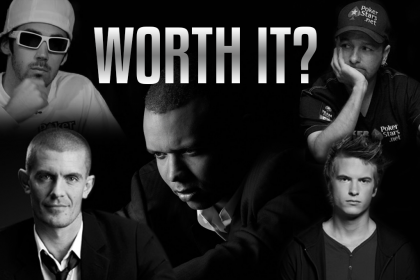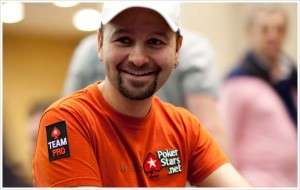Do Poker’s Big Names Automatically Deserve Sponsorship?
(Editor’s note: The opinions expressed herein do not necessarily reflect the viewpoints of FlushDraw or its publishers.)
In recent weeks we have seen some of the online poker sites slimming down their sponsored players rosters, and the resulting discussion on the online forums has raised some concerns among poker players. Discussions have been had about players who have been cut, and how they appealed or didn’t to certain groups of players. What hasn’t really been discussed much is poker’s big names, and how much value these players bring to the sites that pay them such large sums of money.
These discussions are happening against a unique backdrop in online poker. The industry is in a situation where the majority of the United States, which could be considered the spiritual home of the game, is inaccessible to online poker providers. The small parts of the country that are able to play online poker are segregated from the rest of the world, and are serviced by companies in partnership with local “brick and mortar” casinos who are very inexperienced in handling the online space. But even with the US market not being open to all, there are several US based players who still wear patches for companies that have no access to that market, and are unable to play on the sites they represent. Players such as Daniel Negreanu, Vanessa Selbst, Jason Mercier, JC Tran, Mike Sexton and others all fit this model, but not all have managed to retain the same value for their sponsors.
Daniel Negreanu is probably the most recognisable poker player in the world today, and comes with very few negative facets to offset his amazing popularity around the world with poker fans. The fact he lives in Las Vegas is of negligible impact to his value to PokerStars, and probably doesn’t even appear on their radar in regards to his position in the company. He could live in an igloo at the North Pole and PokerStars probably still wouldn’t care. His value isn’t in his appearance online, it’s a combination of his personality, his place in poker history, and his live results. As far as established poker players go, Negreanu is pretty much the ideal as far as it comes to marketing (right up until he says something really controversial).
Mike Sexton maintains some importance globally as the host of the WPT TV shows, and has regained some marketability with his sponsor, PartyPoker, being one of the bigger operators in the small US market. Thing is, I can’t see him being anything more than a break-even prospect in the short to medium term, the opportunities to use this elder statesman of poker just aren’t there. Vanessa Selbst has marginal value appealing to those who understand her achievements and the quality of her game, but her real value to the marketing team at PokerStars is that of a female poker player who is able to play at the highest levels of the game. PokerStars is an equal opportunity marketer, and has been appealing to the female demographic more and more in recent years. It’s a good plan, as I can’t see why would a site want to ignore 50% of the global population.
However, Jason Mercier, JC Tran and the other US players signed to non US-facing sponsors, are another story. To me, they have little value in the current marketing battles between online poker providers in this very competitive market. They do have some future value once the US market opens up, but as we have seen, full 50-state participation in online gambling is a long way off, and may actually be impossible without federal legislation. To my mind, those that have been signed since the loss of the US market from the general player pools have only been picked up because of their “name recognition” appeal. The problem is, new poker players haven’t really heard of most of these “big” names. They are only big names inside the poker industry, and if someone has heard of players such as Jason Mercier or JC Tran, they are probably already engaged in the poker world. I don’t see the value of paying them large sums of money to turn up outside of the US at events where their appeal is almost non-existent.
Location isn’t the only issue with some big name signings. You’d expect a professional poker player wearing a patch to be able to make a profit, or even just play on the site that pays them a wage. Failing that, maybe they could promote the site with the media?
Tom Dwan was signed to a lucrative deal with Full Tilt following their return to the market under new ownership. Full Tilt took a very long time for to show Dwan the door after his failure to play many hands online following his move to Macau to play in the super high stakes games held there. It wasn’t just Dwan failing to play; from what I saw during the Full Tilt vs PokerStars Heads Up Challenge held at EPT London in 2013, Dwan was not working well under the new owners.
There was tension between Dwan and the marketing/PR team. He didn’t want to jump through the hoops his sponsorship required, and his comments after he left “The Professionals” left little doubt that the relationship had soured. Why was the introvert Dwan put in the position where his job was to interact with media and fans in a way he wasn’t comfortable with? He may have been a massive name in online poker, but he had neither the skill or inclination to handle the requirements of wearing the patch. Offering him a big sponsorship deal seems to me akin to setting money on fire. A simple interview would have been enough to ascertain his suitability, or lack of it, for the role. A large company wouldn’t hire a spokesman without at least ensuring the prospective mouthpiece was able to do the job. Why are poker players signed to deals that they can’t fulfill? While this could lead to a larger point about business practices and their implementation in the poker world, I’ll just say that when it comes to sponsored players, not everyone who plays the highest levels of the game is qualified to promote the game in the best light.
Talking about that best light leads me on to two of the biggest names in poker. Gus Hansen and Phil Ivey both currently have sponsorship deals, Gus for Full Tilt, and Ivey is sponsored by his own company, Ivey Poker. The thing is, Hansen is around $20,000,000 in the hole during his online poker career, and Ivey is currently involved in multiple law suits related to the possibility of him gaining an unfair advantage while playing a variation of Punto Banco and Baccarat in London and Atlantic City.
Looking first at Gus, he has been on a pretty steady downward trend for the majority of his online playing career. According to HighStakesdb.com, Gus hasn’t been in the black in his online account since June 2009. The arguments against having a sponsored player losing so much money pretty much write themselves. Gus legitimises losing, and gives those with serious gambling addiction issues a role model. However, most players don’t have the financial backing that Gustav Hansen has. He has made serious money away from the table in selling businesses, he had a long tenure under the original Full Tilt Poker ownership that saw players vastly overpaid, and he is a successful professional backgammon player.
I’ve actually met Gus, and we talked on video in 2013 for another site I work for. He wasn’t concerned about his losses, and was aware that he had what seemed to me to be massive leaks in his game. I really like Gus, and would be very happy to go out on the town for what would be a fantastic night out, but I can’t get behind him as a positive face for poker. He just doesn’t have the hunger and drive that is needed to consistently beat the higher levels of this game, probably because he’s financially secure, and poker could be to him what golf is for a lot of people who retire early. Sponsored players need to either bring people to the game, or be a role model for those taking the game seriously to emulate. Gus is, unfortunately, neither.
Ivey has other concerning issues. With him being effectively labelled a cheat after the legal actions against him, his legitimacy has taken a hit with those who don’t understand what appears to have actually happened in these casinos (Phil took advantage of an printing error on the cards used by the casinos, and didn’t even touch the cards on the table. How the casinos can not pay the man for their error is beyond me) and any non poker media is going to include this ongoing issue in any coverage they give to the man still considered the best all-around player in the game. While he’s never going to lose the sponsorship of his own company, his issues away from the table could remain an issue for the industry as a whole. There are those out there that are gunning for the online poker industry, and any ammunition such as Ivey being branded a cheat by a court is going to be fired not just at Ivey, but at the industry as a whole.
What a lot of poker marketing people haven’t seemed to grasp is that sponsoring a player can have negative impact, both to a brand and the industry as whole. Signing the wrong player can be just as, if not more, damaging as signing the right player can be beneficial. 888 had to backpedal very quickly following media and player comments after brand ambassador Luis Suarez was caught biting a player for the third time during this summer’s World Cup.
The costs of signing a player don’t just revolve around the salary or bonuses a player gets. The outlay in providing marketing materials, events and general costs of handling and managing a sponsored player is significant. If a player fails to make an impact on the market, this outlay is wasted and becomes a drain upon the finances of the company. This happens too often, and one ends up seeing a large number of sponsored players who cash a cheque every month, then fiddle while another poker site burns.
The goals of signing a player are pretty clear: you either want to attract new players to the game, or you want to give those already engaged a role model to emulate and strive to outdo. While I have raised concerns with some of the players under contract with PokerStars, they do seem to have the best grip on who to sign. Vicky Coren-Mitchell, as I have said before, is a great example of someone who brings new people into the game. She has a profile outside of poker, and cross pollinates the game with her TV and writing fans. Rafa Nadal’s signing has also been handled rather well. The journey that PokerStars has documented using videos and blogs has shown a top class sportsman go from a poker novice into someone who can enjoy the game while playing at a reasonable level. On the other side of the coin, Ike Haxton is the best example of a patched professional poker player. He’s a long term winner, but he is also able to promote the game through talking to fans and media. He can explain complex strategy in a way that is easily understandable by the majority of players, and his appearances on some of the PokerStars live streams have been highlights for all involved.
Sponsoring a player needs to be part of an overall marketing strategy, and signing one of poker’s big names is no longer a way to attract players to a single site, let alone the game itself. If poker is ever really going to shed its shady image and be accepted as a game of skill by the mainstream, the players who represent it need to embody the best parts of the game. They must be relevant to the potential players they are presented to, and above all they must be able to promote the game without their own baggage becoming the story. While parts of the industry are starting to change their sponsored player model towards this goal, we are a long way from seeing this as an industry standard.
























COMMENTS